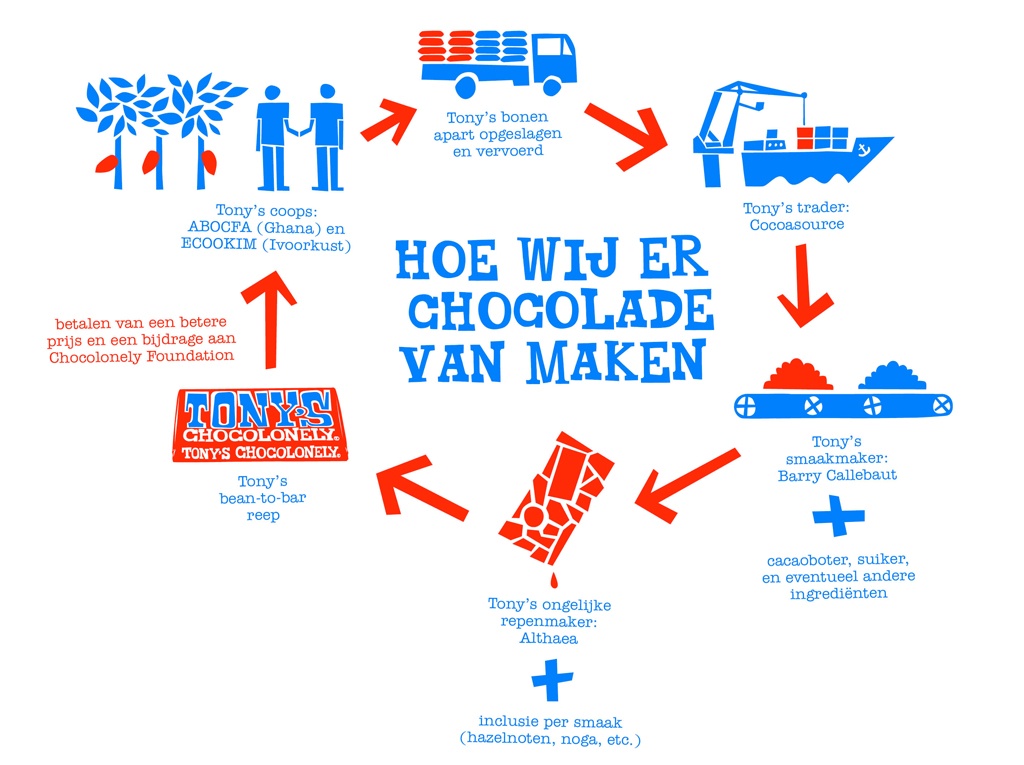
Since 2012, we have been purchasing our cocoa in a traceable manner from farmers in Ghana and Ivory Coast with whom we have a long-term relationship. An important step towards 100% slave-free chocolate that we are very proud of, so we would like to tell you more about it. In fact, we have so much to say about it that we're chopping the story into three parts. In this first blog you can read about the farmer cooperatives we work with and the purchasing process of the cocoa that these farmers produce.
Traceable purchasing of cocoa
Last year around this time we placed our first order of cocoa beans with farmers' cooperative ABOCFA in Ghana and one with cooperative Ecookim in Ivory Coast. These cocoa beans are processed separately for us and are therefore fully traceable.
Traceable cocoa is new for chocolate in the supermarket. Most cocoa is traded as a bulk commodity: the beans end up in one heap and are then resold on the export market. It is then not clear where exactly the cocoa comes from. We believe that you can only help someone out of a hole when you enter into a relationship with them: only then will you know what is going on and can you tailor activities to their needs.
There are three parties between the Ghanaian farmers and us: a local trader, the Ghanaian government and a buyer. To trade cocoa in Ghana you need a government permit. ABOCFA farmers do not (yet) have this permit because they do not have enough knowledge and resources for it. Like trucks for example, to get the beans to the port.
To get the cocoa from the farmers to our chocolate factory, we work with one local partner who has such a permit from the government. He collects the beans from the farmers, ensures that they receive money immediately and sells the beans to the COCOBOD: a kind of Ministry of Cocoa that buys, inspects and sells all cocoa from farmers in Ghana. The COCOBOD exports the beans to Cacaosource: the company that imports cocoa on our behalf.
Direct contact
The major cocoa harvest in West Africa started in October. We then make agreements with our importer and the farmers we work with about the amount of cocoa we think we need. Part of Tony's team will then fly to Ghana and Ivory Coast to express our expectations to the cocoa farmers.
This direct contact with West African farmers is quite unusual for a chocolate maker who has his bars in the supermarket. But we think this is extremely important! Not only because we let the farmers taste the bars made from their cocoa, but also because through this contact we know what problems the farmers encounter and can help them find a solution.
By offering training to increase their production, for example. Or set up an awareness campaign about the fact that child labor is really not normal. By bringing farmers into contact with other parties who would like to buy their cocoa at a good price. And by working with an accessible, reliable trader who immediately pays out the better price we offer. These are all examples that help the cocoa farmer to professionalize and become more independent.
Until next time!
There. Now you know the first part of the route that produces the cocoa in our bars and you know why the long-term relationships we have with the farmers who provide us with this cocoa are so important. But cocoa still has a long way to go from here before it can be turned into chocolate. In the next blog you can read how the beans are shipped and what happens to them when they arrive in Antwerp.